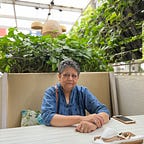Caught in Nature’s Grip: Memories of the Kutch Earthquake
When The Earth Shook
“How do you react when devastating news shakes your world from miles away?”
It was a sunny Sunday morning in Bangalore on January 26, 2001. Since it was Sunday, my husband and son decided to go to their favourite restaurant for a South Indian dosa breakfast.
We were enjoying our breakfast when shocking news appeared on television. I couldn’t stop shaking as I thought about all my friends in Kutch.
A massive earthquake measuring 7.7 on the magnitude scale had hit Kutch in Gujarat. At 8:30 am on January 26, when the entire country was preparing to celebrate Republic Day, a devastating earthquake rocked Kutch.
I grew up in Kutch and completed all my schooling there. We used to stay in the Kandla Port Trust colony near Gandhidham. I was familiar with the terrain.
The Kutch region in Gujarat is prone to earthquakes, and during our stay of almost 20 years, we frequently experienced mild to severe earthquakes, but nothing as big and destructive as the one that struck Bhuj and neighbouring places on January 26, 2001.
I tried calling my friends in Kutch, but the phone lines were down. Telecommunication, water, electricity, and other services were disrupted, and people had left their homes, so there was no way to reach them.
The earthquake killed more than 20,000 people and injured over 150,000 others. It left hundreds of thousands homeless and destroyed or damaged more than a million buildings.
The maximum damage was in Bhuj, Gandhidham, Anjar, Bhachau, and Rapar. Multistoried buildings collapsed in these places. All the lanes in the central part of Bhuj and these other places were full of rubble and debris.
I couldn’t fathom how places I had visited countless times, such as the streets where I played as a child, my school building, and nearby houses, could crumble like a house of cards.
After about a week, I connected with a friend, and what he described left me shocked.
I had lost four good friends. One of our family friends and my father’s colleague, a lady doctor, succumbed to injuries while trying to rush out of the house. She and her husband were alone when the earthquake shook their home. The husband was busy preparing tea, and when he felt the tremors, he rushed to wake his wife so they could run out. But before they could escape, the ceiling collapsed, and both died on the spot.
I lost three more friends. One of them had gone to Bhuj for vacation and died while visiting some friends on the morning of January 26. He and his friends were at a restaurant when a falling wall, caused by the tremor, hit him as they tried to rush out.
The earthquake left hundreds of thousands of people homeless, and many lives were lost. My friend described the town as looking almost like a ghost town.
People in Bhuj were scared to return home and slept in their cars and on the streets with their families.
A couple of years after this tragic disaster, when I visited Kutch for a school reunion, I met the families of my friends who had lost their loved ones.
Hearing their descriptions and experiences of the morning of January 26, 2001, and the months following the earthquake left me feeling deeply sad and emotional. Life is short and fragile; it can be taken at any moment.
Conclusion
Natural disasters, like the 2001 Kutch earthquake, remind us of nature’s immense power and fury. They can cause widespread devastation, taking lives and homes and leaving lasting scars on communities.
Such events force humanity to confront its vulnerability and highlight the need for preparedness, resilience, and compassionate response to aid those affected.
The destruction left in the wake of nature’s anger is a stark reminder of our fragile existence on this planet.
Thankyou Sahil Patel for this nature prompt.
Checkout these stories by our Reciprocal writers
Sahil Patel article on Exploration of recent natural disaster
A beautiful article by Gauri Sirur on the power of birdsong.
Penny Grubb’s article on Getting Close to Nature
